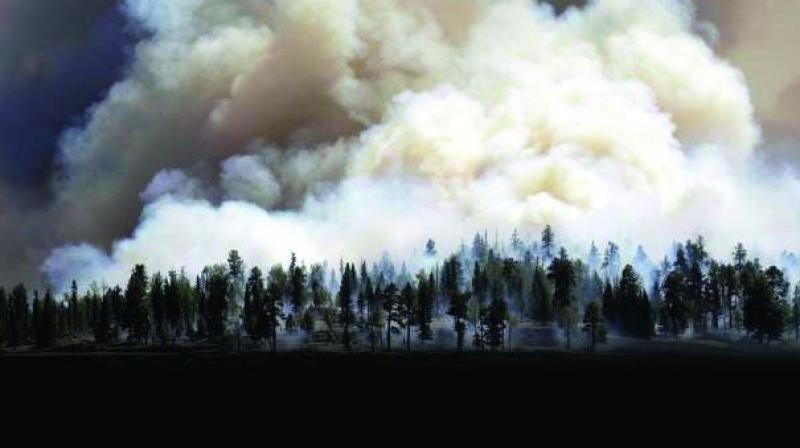So, let's talk green: More and more carbon, less and less food

I was in Jaipur earlier this week conducting a climate change workshop for probationers of the Indian Audit Service. During the coffee break, I took a call from a friend who has total anti establishment views. This time he was critical of the 'bu** shi** in the report', as he termed. He was referring to a parliamentary standing committee's report on agriculture that was tabled in the Indian parliament recently, which detailed how food production will be affected adversely because of climate change.
His timing was fortuitous for me, as I had just told the probationers, who are the future generation of the Indian Audit & Service, how major systems like water, food, health and infrastructure is getting affected by climate change. My audience was thankfully more open minded than my raucous friend! As much as I tried to put the facts on the table, my friend like many farmers in the country are finding it difficult to accept the facts.
Until now we have seen how food production is affected by failed monsoons, drought conditions or excessive rainfall and floods. But being told that beyond these, there are other factors kicking in which relate to climate change, seems to be hard to accept. The global food system is complex and shaped by many interrelated factors that are all touched by climate change. A temperatures, increase the availability of water changes and the composition of the air changes too. As a result, the crops that have evolved to succeed in the conditions of the last 10,000 years now face new challenges.
The report tabled by 31-member parliamentary standing committee says that rice production in north-west India comprising Haryana and Punjab is projected to reduce by 6% to 8% by 2020. Whereas in other parts of the country the loss would be below 5%. Yields in major crops like wheat, rice and maize will decrease. The report says that in 2050, it is estimated that maximum and minimum temperature will go up by 2.40 degrees Celsius and 40 degrees C, respectively. Punjab, Haryana and Bihar will be the severely affected due to the rise of minimum temperature, because it causes heat stress for the crops. Heat stress reduces yields of crops.
The other aspect of climate change that affects crops is the nutritional value of the crops - something that is rarely discussed. Scientists are saying that growing levels of atmospheric carbon dioxide from emissions will seriously impair the nutritional value of wheat, rice and other staple crops, putting millions of people around the world. In a report published by the Environmental Health Perspectives says that if CO2 levels continue to rise as projected, the populations of 18 countries may lose more than 5 percent of their dietary protein by 2050.
"These findings are surprising," said Samuel S. Myers, senior research scientist in the department of environmental health at Harvard's T.H. Chan School of Public Health, who authored the study. "If we sat down together 15 years ago and tried to anticipate the human health impacts of anthropogenic CO2 emissions, we would not have predicted that our food would become less nutritious. If we disrupt and transform most of the natural systems on our planet, we will continue to encounter surprises like this."
The scientists found that under increased CO2 concentrations, the protein content of rice, wheat, barley, and potatoes decreased by between 6% and 14%. The study?-?believed to be the first to quantify this risk?-?estimates that an additional 150 million people globally could suffer from this nutritional loss. This could prove especially risky for children and an estimated 1 billion women of childbearing age. The study projects a loss of nearly 4 percent of dietary iron as a result of the CO2 effects. Collectively, these nutritional deficiencies "represent very high burdens of disease," Myers said. "They kill people."
Climate change is having an adverse effect on agriculture on multiple fronts. Farmers need to recognise this and think of strategies to mitigate and adapt to a whole new world - a world that will increasingly feel the adverse.

